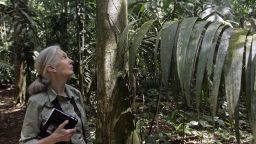For Britons stretching back generations, he’s the voice of our planet. Softly spoken and with reassuring cadence, David Attenborough has guided audiences on many a journey through the natural world. From perilous mountaintops to frozen tundra, tropical rainforest to the watery abyss, there are few places his voice has not carried.
At 90 years old, we’re more likely to find the naturalist recording voice-overs than in the field, but last autumn there he was, back on our screens, navigating the Alps in a hot air balloon, introducing the sequel to flagship BBC series “Planet Earth.” He shows no sign of stopping, says CNN’s Christiane Amanpour; one of the many reasons she selected Attenborough for CNN series My Hero.
Attenborough’s “Planet Earth II” marked another chapter in a storied television career stretching back to 1953. He began as a BBC producer, first stepping in front of the camera for “Animal Patterns” with co-presenter Julian Huxley, noted biologist and grandson of Thomas Henry Huxley, Charles Darwin’s right hand man. But it was “Zoo Quest” (1954-1963) that cemented the young broadcaster’s reputation as an intrepid naturalist, seeking out lemurs in the forests of Madagascar and climbing trees to catch pythons in Indonesia.
The khaki-clad explorer traveled the globe, following a team from London Zoo and its search for new specimens. A product of its time, Attenborough’s filmmaking has since evolved, along with his audience. His seminal series “Life on Earth” was watched by 500 million people in 1979, while Planet Earth II, scored by Academy Award-winner Hans Zimmer, became the UK’s most watched nature show in 15 years.

A life-long conservationist, he confessed in 2011 he was once sceptical of climate change, “cautious about crying wolf.” But the evidence, he realized, was incontrovertible. It’s clear when we watch Attenborough now that we’re witness to nature’s majesty, but also just how delicately the biosphere is poised.
“He probably has done more than any single individual to crystallize for the world why taking climate change seriously is a moral and an existential imperative,” says Amanpour, recalling their interview at the Paris COP21 talks.
Attenborough’s reach is vast, his reputation without question. Such is his status that it was former president Barack Obama, and not Attenborough, who did the interviewing when the two met in 2015.
Attenborough described the interview as “an extraordinary experience that I’ll never forget.” President Obama, likewise, called the occasion a privilege. The meeting of minds also helped place the issue of climate change front and center of White House politics.
“The resilience of the natural world gives you great hope,” Attenborough told President Obama. “Given half a chance, it really takes it and works with it. But we are throwing huge problems at it.”
“More and more species are on the brink of extinction,” Attenborough told Amanpour at COP21. (The International Union for Conservation of Nature currently lists 24,307 species of animal, birds, insects, aquatic life and plants as threatened with extinction.) But, he added, “humanity is coming to its senses.”
Whether the previous administration’s work on climate change will be for naught remains to be seen. There’s multiple causes for concern in the early days of the Trump presidency: from mooted oil exploration on federal land to the possibility the US will pull out of the Paris climate agreement. (Attenborough has stated he is a strong proponent of green energy, suggesting clean energy storage technology holds the key to superseding the fossil fuel industry.)
Elsewhere, the naturalist spoke to Amanpour last December of the “vanity” of poaching, citing the potential of elephant extinction as a “crime [that] will rest heavily on humanity’s shoulders.” Some initiatives are working – giant pandas are no longer on the IUCN list of endangered species – but the eastern gorilla, the species at the heart of “Life on Earth’s” most iconic scene, is now listed as critically endangered.
“The letters I get bring tears to the eyes, from kids of all ages,” Attenborough told Obama. “Young people, they care. They know this is the world they’re going to grow up in and spend the rest of their lives in.”
At 90, Attenborough has retained his childlike curiosity of the natural world, and remains their kindred spirit; aware, however, of the responsibility of older generations for our planet’s future prosperity.
“He’s my hero,” says Amanpour, “because he’s not a young man anymore, but he’s still fighting the good fight.”





















